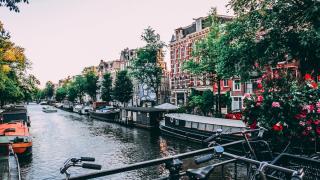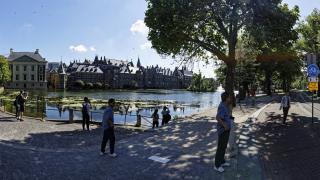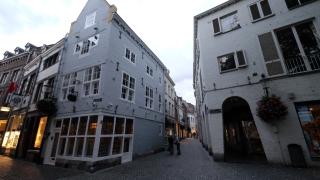Why Choose Dutch Hostels?
Dutch hostels are concentrated in major cities like Amsterdam, Rotterdam, and Utrecht. Most are within 10 minutes’ walk from train stations. Beds in shared dorms cost €25–€45 per night in Amsterdam. Private rooms average €70–€120. Many hostels offer bike rentals for €10–€15 per day, reflecting Dutch cycling culture. Common areas are social hubs, often featuring canal views or historic architecture. Dutch hostels frequently host communal dinners, pub quizzes, and local beer tastings. Travelers include solo backpackers, students, and festival-goers. Dutch hostels differ from hotels and Airbnbs:
- No curfew; 24-hour reception is standard
- Lockers and keycard access for security
- Free Wi-Fi and luggage storage
- Local city tax (toeristenbelasting) is added, usually €3–€7 per night
- Breakfast is often Dutch-style: bread, cheese, and hagelslag
Some hostels are in converted canal houses or former schools. Stays are flexible, from one night to several weeks. Dutch hostels focus on sustainability, with recycling and energy-saving measures common.
Budget Breakdown: Costs & Value
Hostel prices in the Netherlands vary by city and season.
- In Amsterdam, expect €30–€55 per night for a dorm bed. Private rooms cost €80–€150.
- Rotterdam and Utrecht dorm beds: €25–€40. Private rooms: €65–€110.
- In smaller cities like Groningen or Leiden, dorm beds start at €20–€30. Private rooms: €50–€90.
- Prices rise 20–40% in April–September, especially during King’s Day and major events.
- Weekends are more expensive than weekdays, especially in Amsterdam.
What’s included:
- Linens are standard in Dutch hostels.
- Towels are sometimes extra (€2–€4).
- Free Wi-Fi is common.
- Breakfast is often not included; when available, it costs €5–€9.
- City tax (toeristenbelasting) is usually not included. In Amsterdam, this is 7% plus €3 per person per night.
How to save:
- Book early for best rates, especially in spring and summer.
- Consider hostels in Haarlem or Zaandam for cheaper options near Amsterdam.
- Stay in larger dorms (8–12 beds) for lower prices.
Comparison:
- Hostels are cheaper than hotels (average €120+ per night) and most Airbnbs.
- Dutch hostels offer secure storage, kitchens, and social spaces, adding value for budget travelers.
Booking Smarts: Finding Your Bed
Booking Dutch hostels is easiest online.
- Use platforms like Hostelworld, Booking.com, and Stayokay.nl for the widest selection in the Netherlands.
- Amsterdam hostels fill up weeks ahead, especially April–September. Book at least 2–4 weeks in advance.
- Walk-in beds are rare in Amsterdam and Utrecht. Rotterdam and smaller cities may have limited walk-in options.
- Most hostels are in city centers, near Centraal Station or tram lines. Check walking distance to public transport.
- Outskirts hostels are cheaper but can add €3–€7 per day in transit costs.
- Dutch hostels often require payment on arrival. Credit cards and Maestro are widely accepted; some accept cash only.
- Free cancellation is common up to 24–48 hours before arrival. Non-refundable rates are cheaper but strict.
- Some hostels require a €5–€10 key deposit, refunded at checkout.
- Minimum stay rules apply during weekends, King’s Day, and major events.
- Age limits exist: some hostels only accept guests 18–35 years old.
- Check for extras: bike rental, breakfast, and lockers are not always included in the price.
Inside a Dutch Hostel: What to Expect
Dutch hostels offer mixed dorms, female-only dorms, and private rooms.
- Dorms usually have 4–12 beds. Bunk beds are common. Curtains for privacy are rare in older hostels.
- Private rooms are available in most hostels. Prices range from €80–€150 per night in Amsterdam.
- Female-only dorms are standard in cities like Amsterdam and Utrecht.
Facilities:
- Guest kitchens are common. Expect basic equipment: stove, fridge, utensils. Some hostels charge €2–€3 for kitchen use.
- Bike rental is widely available. Rates are €10–€15 per day. Hostels often partner with local fiets (bike) shops.
- Lockers are provided in all hostels. Bring your own padlock or rent one for €2–€4.
- Laundry facilities are self-service. Typical cost: €5–€7 per wash/dry cycle.
- Social spaces include lounges, terraces, or gardens. Many hostels have in-house bars or cafés serving local beer and snacks.
Atmosphere:
- Social events are frequent: pub crawls, canal tours, Dutch pancake nights.
- Quiet hours are enforced, usually 23:00–07:00.
- Accessibility is improving. Many hostels have lifts and step-free access, especially in newer buildings.
- Inclusive policies are standard. LGBTQ+ friendly and gender-neutral bathrooms are common in Amsterdam hostels.
Safety & Etiquette: Staying Secure
Dutch hostels meet strict fire and safety regulations. Keycard access is standard in Amsterdam and Rotterdam hostels. Lockers are provided in almost all dorms. Bring your own padlock; some hostels rent them for €2–€4. CCTV cameras monitor entrances and common areas. Reception is staffed 24/7 in most city hostels.
- Store valuables in provided lockers. Do not leave electronics or passports on beds.
- Quiet hours usually start at 23:00. Noise after this time is not tolerated.
- Dutch hostels expect guests to clean up after themselves in kitchens and lounges.
- Shoes are often not allowed in sleeping areas. Look for signs or ask staff.
- Smoking is banned indoors by Dutch law. Some hostels have designated outdoor areas.
If you have issues, contact reception immediately. Staff speak English and Dutch. In emergencies, dial 112. Police stations are usually within 1 km in major cities. Hostel staff can help with lost items or disputes.
Quick Tips for a Smooth Stay
Pack a European plug adapter (Type C or F). Dutch hostels rarely provide them. Bring a reusable water bottle; tap water is safe everywhere. Many hostels in the Netherlands use keycard entry—keep it with you at all times. Bike rentals are common in Amsterdam and Utrecht hostels; expect €10–€15 per day. Use hostel kitchens for self-catering; supermarkets like Albert Heijn are nearby. Join communal dinners or pub crawls—these are popular for meeting travelers. Learn basic Dutch phrases: “Dank je wel” (thank you), “Waar is het station?” (where is the station?). Dutch hostel staff usually speak English, but locals appreciate greetings in Dutch. Check if breakfast is included; some hostels charge €5–€8 extra. Before booking, confirm if lockers, linens, and towels are provided. Some hostels charge €2–€3 for towel rental.












